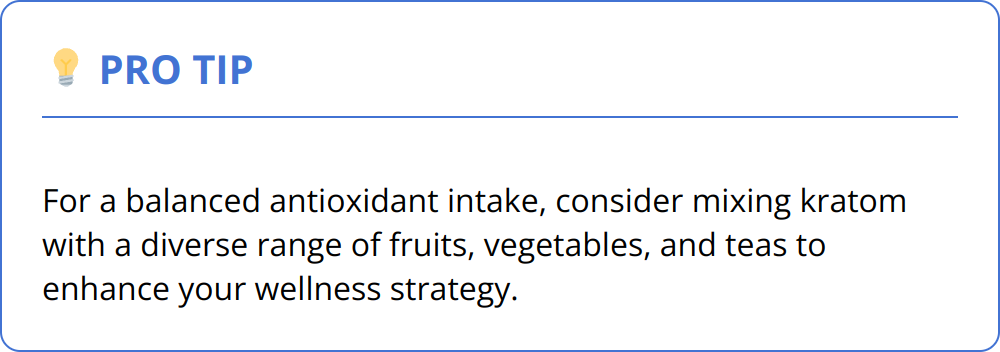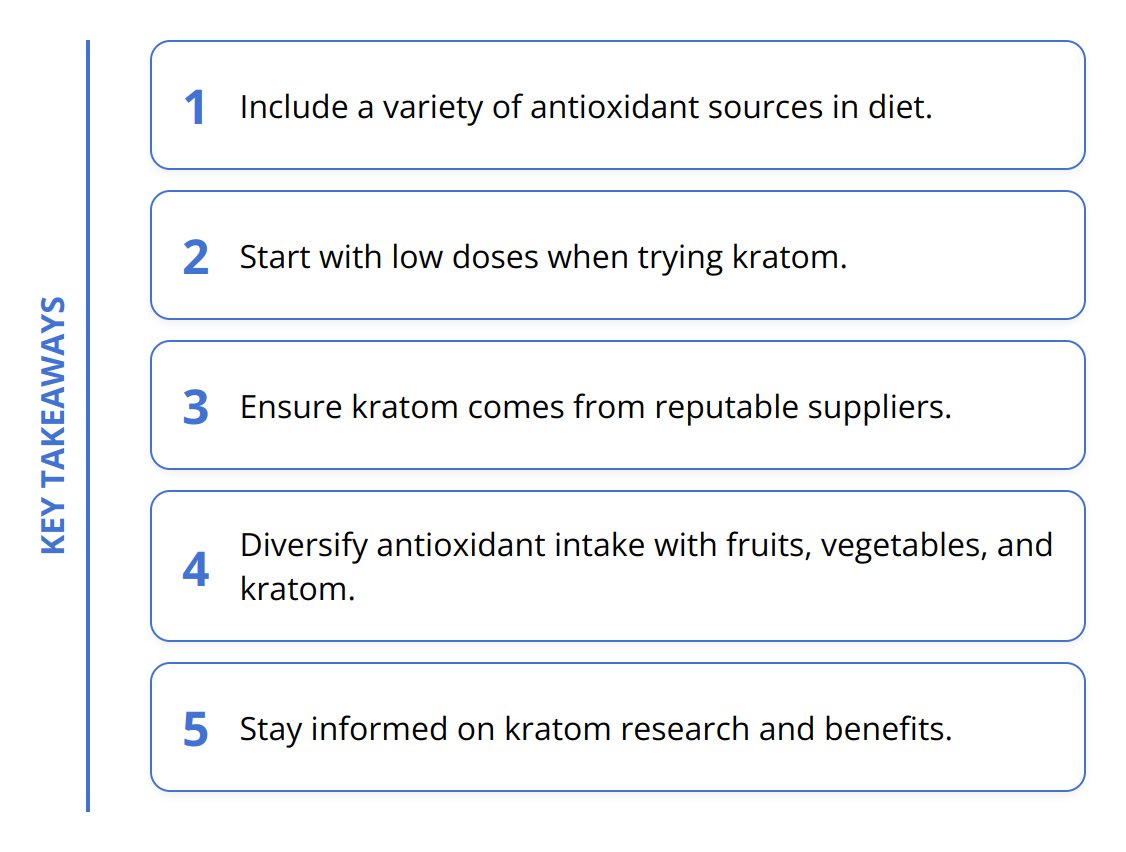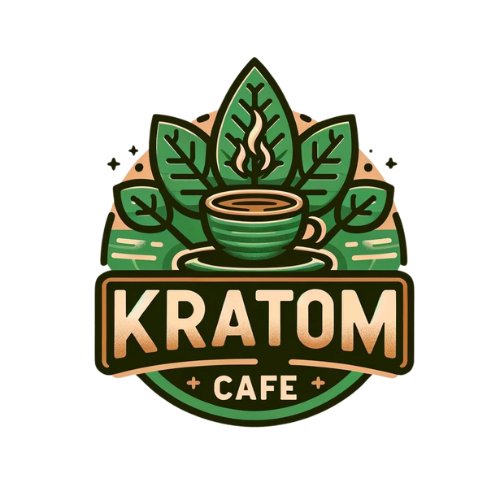Antioxidants are vital for maintaining health and preventing diseases, serving as the body’s defense against the damaging effects of free radicals. We at Kratom Cafe believe that understanding the source and effectiveness of antioxidants, including those found in kratom, is essential. This post explores kratom’s antioxidant properties and compares them with other natural sources. It also delves into the potential health benefits and the latest research findings, providing a comprehensive glance at how kratom can contribute to your wellness strategy.
Why Are Antioxidants Essential?
Antioxidants play a crucial role in safeguarding our health by protecting our bodies from the harmful effects of free radicals. These unstable molecules can damage cells, leading to chronic diseases and aging. Here, we focus on the significance of antioxidants, how they function, and where you can find them, including an often-overlooked source: kratom.
Antioxidants are substances that can prevent or slow damage to cells caused by free radicals. When our bodies use oxygen, they produce free radicals as a byproduct, which can cause oxidative stress if not balanced by antioxidants. This stress is linked to heart disease, cancer, arthritis, stroke, respiratory diseases, immune deficiency, emphysema, Parkinson’s disease, and other inflammatory or ischemic conditions.
The role of antioxidants extends beyond neutralizing free radicals. They also contribute to the regeneration of skin, reduce inflammation, and play a vital part in preventing chronic diseases. While the body can produce some antioxidants, it relies heavily on dietary sources to obtain the remainder.
Sources of Antioxidants:
-
Fruits and vegetables are the most well-known sources, rich in vitamins C and E, as well as beta-carotene and minerals.
-
Nuts, grains, and some meats, poultry, and fish, offer selenium, a mineral that acts as an antioxidant.
-
Kratom, a natural plant, is emerging as a powerful source of antioxidants. Research suggests that kratom contains several compounds, including mitragynine, which exhibits antioxidant properties comparable to those of conventional antioxidants.

To truly benefit from antioxidants, incorporating a variety of sources into your diet is key. Each source offers different types of antioxidants, working together to protect your body from various angles.
-
Eat a colorful plate: Consuming a wide range of fruits and vegetables ensures a broad spectrum of antioxidants.
-
Don’t overlook herbs and supplements: Plants like kratom are not traditionally considered when thinking of antioxidants but can offer unique benefits.
Understanding and tapping into natural sources of antioxidants like kratom can be instrumental in enhancing your health and well-being. As interest in alternative and complementary health practices grows, kratom’s antioxidant properties present an area ripe for exploration. However, it’s essential to approach its use with knowledge and caution, armed with the latest research and understanding of its effects. For those curious about incorporating kratom into their wellness regime, it’s recommended to read further on kratom as an antioxidant and consult healthcare providers.
Incorporating various antioxidants into your diet can buffer your health against the onslaught of free radicals. Start small, by adding an extra serving of berries to your breakfast or a handful of nuts as an afternoon snack, and consider exploring the antioxidant potential of kratom for a well-rounded defense.
Kratom’s Antioxidant Power
Kratom, a tropical tree native to Southeast Asia, is gaining recognition not just for its unique effects on mood and energy but also for its potent antioxidant properties. Exploring kratom’s role in combating oxidative stress offers a fresh perspective on how this natural herb can support overall health.
Unveiling the Antioxidant Compounds in Kratom
Kratom leaves are rich in bioactive compounds, primarily mitragynine, which research suggests acts as a powerful antioxidant. This compound, alongside others like 7-hydroxy mitragynine, plays a crucial role in kratom’s ability to fight oxidative stress by neutralizing free radicals. It’s these compounds that set kratom apart, offering potential health benefits that extend beyond traditional uses.
How Kratom Stands Up to Other Antioxidants
When comparing kratom to other natural antioxidants, it’s vital to understand that each source has its unique advantages. Fruits and vegetables, for example, are celebrated for their antioxidant content, including vitamins C and E. However, kratom’s antioxidant profile is distinct due to its alkaloid content, which may offer complementary benefits not found in your typical dietary sources.
For individuals looking for alternatives or additions to their antioxidant intake, kratom could be a noteworthy contender. The key here is diversity in your antioxidant sources for a comprehensive approach to combating oxidative stress.

Evidence Behind Kratom’s Antioxidant Effects
While scientific research on kratom is still emerging, studies have identified its potential antioxidant capabilities. For instance, mitragynine has been shown to exhibit neuroprotective effects through its antioxidative action, which can be particularly beneficial for brain health. These findings suggest that kratom could be a valuable component in a holistic strategy to manage oxidative stress and reduce the risk of chronic diseases.
Practical Tips for Incorporating Kratom as an Antioxidant:
-
Start with Low Doses: If new to kratom, begin with small amounts to see how your body responds.
-
Diversify Your Sources: Combine kratom with other antioxidants like fruits, vegetables, and teas to maximize benefits.
-
Quality Matters: Always source your kratom from reputable suppliers to ensure purity and effectiveness.
-
Stay Informed: Research and understand the potential effects and benefits of kratom before adding it to your wellness routine.
As the interest in natural health solutions continues to grow, kratom’s unique properties, including its antioxidant potential, warrant further exploration. However, as with any supplement, it’s paramount to approach its use responsibly, armed with information and an understanding of its effects on your body.
For those considering kratom, consult kratom and wellness for insights and guidance on safely integrating kratom into your health regimen.
Kratom and Health Benefits
Kratom, known for its unique alkaloid profile, including mitragynine and 7-hydroxy mitragynine, has sparked interest for its antioxidant properties. These could play a significant role in reducing oxidative stress, which is a key factor in the development of chronic diseases such as heart disease, cancer, and neurodegenerative disorders. The potential of kratom to contribute to disease prevention and enhance general health and well-being should not be underestimated, and here’s why.
Oxidative stress results from an imbalance between free radicals and antioxidants in your body. This imbalance can lead to cell and tissue damage, contributing to aging and diseases. Antioxidants found in kratom may help rebalance this scale, offering a natural way to protect against these negative outcomes. The ability of kratom to act as an antioxidant is not just a theory—it’s backed by compounds present in the leaves themselves.
The Role of Kratom in Disease Prevention
Research into kratom’s health benefits is ongoing, but the potent antioxidant activity of kratom’s alkaloids, primarily mitragynine, could be a game-changer in how we approach disease prevention. These compounds have the potential to neutralize harmful free radicals, potentially slowing the progression of chronic diseases and even preventing them.
Enhancing General Health and Well-being
Beyond disease prevention, kratom’s antioxidants could offer broader benefits for overall health and wellness. These benefits might include improved cognitive function, as oxidative stress is known to impact the brain and memory. Furthermore, the anti-inflammatory properties of these antioxidants could aid in pain relief and reduce inflammation-related discomfort, a common ailment for many.
Insights from User Experiences and Research
Although more studies are needed to fully understand the extent of kratom’s health benefits, anecdotal evidence from users points to positive effects on mood, stamina, and wellness. Some studies support these claims, suggesting kratom’s neuroprotective and antioxidative properties might offer more than just anecdotal relief. For instance, the neuroprotective effects of mitragynine underscore its potential role in brain health and cognitive function.

For those considering incorporating kratom into their health regime, here are some actionable tips:
-
Prioritize quality by sourcing kratom from reputable vendors.
-
Combine kratom with a diet rich in other antioxidants like fruits and vegetables to amplify benefits.
-
Stay updated on latest research and user experiences for informed usage.
Exploring kratom as an antioxidant presents a promising avenue for those interested in natural health alternatives. With its potential to combat oxidative stress and contribute to disease prevention, kratom deserves attention in the wellness community. For insights on using kratom for wellness, consider reading how to use kratom for wellness. As with any supplement, mindful and informed use of kratom is essential for maximizing its health benefits.
Final Thoughts
Kratom’s intriguing potential as an antioxidant adds a new dimension to its already diverse profile of benefits. With compounds like mitragynine showing promise in neutralizing harmful free radicals, kratom offers an alternative avenue for bolstering our body’s defense against oxidative stress. This, in turn, could play a pivotal role in reducing the risk of chronic diseases and enhancing overall well-being.

However, as kratom steps into the spotlight, informed dialogue and further research are imperative. The evolving body of scientific evidence points to significant health benefits, but a comprehensive understanding of kratom’s effects and optimal use scenarios is still developing. Therefore, we encourage both the scientific community and kratom enthusiasts to pursue deeper investigations into this natural herb’s potential.
For those intrigued by kratom’s antioxidant capabilities, we stress the importance of safe use practices:
-
Prioritize high-quality kratom from reputable sources.
-
Begin with low dosages to assess individual response.
-
Consult with healthcare professionals, especially for those with pre-existing conditions or taking other medications.
At Kratom Cafe, we’re committed to fostering a well-informed community keen on exploring kratom’s full spectrum of benefits responsibly. Our platform is a treasure trove of articles, guides, and discussions aimed at demystifying kratom while ensuring our readers have access to the most current and factual information.
As we continue to unravel kratom’s mysteries, we invite you to join us in this journey of discovery. For more insights into kratom’s potential and how to integrate it into your wellness routine, explore our resources at Kratom Cafe.
Remember, the future of kratom and its place in health and wellness is a collective exploration—one that requires curiosity, caution, and an open mind.

